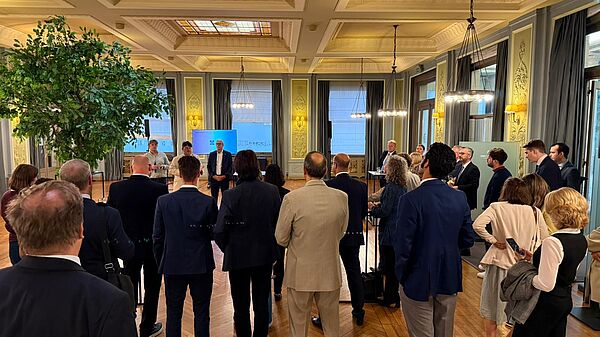On September 8, 2025, the PeaceTech Alliance and Gaia-X Hub Austria hosted a policy dialogue entitled “Co-Designing PeaceTech and Dataspaces” in Brussels. At around 6:30 p.m., experts from the fields of research, politics, civil society, and technology development gathered at the Résidence Palace to discuss the role of digital technologies in promoting peace and cooperation.
The Peace Tech Alliance is an initiative of the AIT Austrian Institute of Technology, which was also presented in the Austrian-led cluster “Technology and RTI” on the civilian dimension of the EU's Common Security and Defense Policy (CSDP), https://www.eeas.europa.eu/eeas/csdp-structure-instruments-and-agencies_en.
The focus was on two key topics:
- PeaceTech in co-design: Peace-promoting technologies must be developed in collaboration with local actors, users, and decision-makers to ensure effectiveness, trust, and ethical standards.
- Dataspaces and digital sovereignty: Sovereign and secure data exchange platforms open up new opportunities for collaboration and crisis prevention, but require clear governance models, interoperability, and protection of sensitive data.
The event was moderated by Ambassador Philipp Agathonos (Federal Ministry for European and International Affairs), who headed the CSDP cluster “Technology and RTI” until 2024.
Helmut Leopold, Head of the Center for Digital Safety & Security at the AIT Austrian Institute of Technology and Chair of Gaia-X Hub Austria, emphasized in his expert contribution the need to always link technological innovation with social responsibility and, above all, to consistently build sovereign and distributed data spaces in the EU based on values such as transparency, security, and trust. Only sustainable data sovereignty guarantees a fair and thriving economy and is the foundation for democratic societies.
Nathan Coyle, AIT and ACP, internationally recognized open data experts, explained the goals and approaches of the new PeaceTech Alliance.
The event combined presentations with open dialogue sessions and provided an opportunity for intensive exchange during the networking dinner that followed. Particular emphasis was placed on the importance of cross-sector cooperation—from research to international organizations to civil society initiatives.
The policy dialogue not only strengthened the visibility of the PeaceTech Alliance in European discussions, but also provided important impetus for the further development of trustworthy, human-centered technologies. The participants agreed that only through joint design can PeaceTech solutions and dataspaces realize their full potential for peace and social cohesion.



